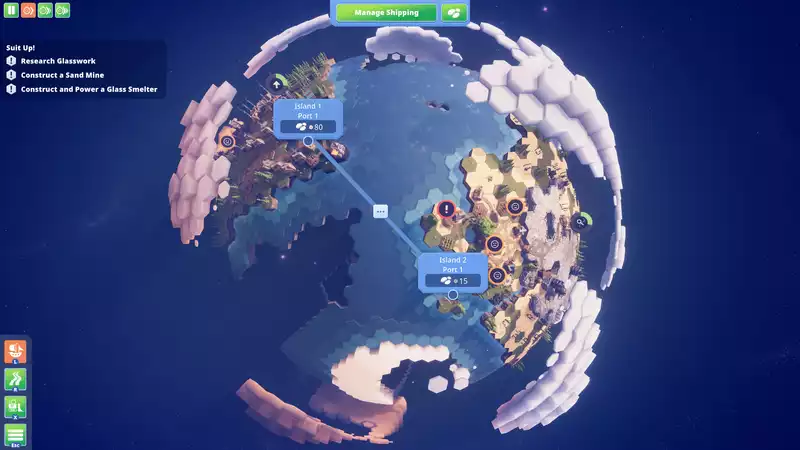Space Whale. The closest thing to an antagonist in this gentle city builder is not a being to be feared, but simply out to get your vegetables.Before We Leave is a non-violent city builder/4X game, proudly wearing hexes (12 hidden pentagons, as geometrically possible) and hangs a small rustic sphere in the void.
Citizens of your new civilization emerge from the ashes of the old. Specifically, they emerge from vertical-access nuclear bunkers that look like repurposed missile hangars; it's not Fallout, so securing housing takes precedence over slaughtering the local wildlife for trade goods. Humans have been underground long enough for the earth to regenerate, but not long enough to evolve into Morlocks. It is a perfect balance.
The land is lush and forested, although there are occasional remnants left behind by the continent's previous owners before a nuclear attack turned it into a plasma fog. Deserts, rocks, and ice appear later, but all are covered by a magnificent hexagonal layer of clouds, which recede and change shape as the earth rotates. Since only a portion of the explored world is visible, most of the time we are looking at an arc of space.
Zoom out far enough and you can even see the local stars, their light covering everything. This means that there is a day/night cycle, which changes the behavior of the population and makes it a little harder to tell what they are doing at night.
Citizens, it must be said, are very cute. Like wooden toys, they trot along quite fast, even when the game is run at 1x speed (up to 4x speed is possible to pass the time while researching and producing what is needed for progress). However, they are known as "peeps."
But once you get past this, they have their own names, personality quirks, and can clean up pollution (caused by industry or siphoned off by forests and cleaners), improve their diet, build fountains, provide clothing suitable for their living environment, and It is clear that happiness can be increased by doing the following. The last clothing item is especially important, as they do not want to be left out in the desert in tattered clothes, but manufacturing clothes is far down the technology tree when they are just starting out.
Hex may remind you of Civilization, but in fact Before We Leave has much in common with smaller games like Frostpunk. Nevertheless, the game does not have the relentlessly grim storyline of that title, nor does it have the fine-tuned management of power lines and budgets. There is, however, the usual obsession with roads, and the message "this building must face the road" is once again a source of concern for players.
You can pause the game and spend your time plotting the best road network for the needs of your expanding village, or you can go freestyle from the start and demolish one of the terraces of the quaint little huts you built to provide road access to the forest beyond, and maybe even a wood-chopping You could even react to the need for growth by creating a road to build a camp. Reducing travel time between iron mines and smelters would increase efficiency. As a result, the stock of materials would increase, speeding up the building process. This is like a reverse domino effect: a small plastic monolith stands up faster and faster as one is pushed up.
The explorer is indispensable, wandering the land to find stashes of predecessor technology, which he brings back to the library to research his new technology. There are two types of this technology, red and green, and they are not always found in the same land. Others can repair ancient equipment, such as transmogrifier, which transforms raw materials into tools. The game adjusts its pace according to the well-being of its companions. The game is not a game of "building" because if the population declines and as a result materials become scarce, the building process comes to a standstill.
Playing a building game, especially one with 4X tendencies, is a refreshing change and does not serve as a cover for piling up massive amounts of materials and rampaging against other civilizations or trying to nuke Gandhi. Nor does a non-confrontational game force you to use economic units for defense when you could be building an orchard or vegetable garden, researching metalworking, or repairing an ancient ship.
No roaming bandit gangs will come over the hill with their eyes covetously on your valuables. Even the space whales that appear late in the game are not much of a problem. Leaving a trail of devastation at first, it eats away at the greenery like a gentle eating machine (it must be a tooth whale, since a whisker board is useless when eating an entire orchard, but finding space whales is a niche hobby). There are other mysteries in the orbit of your planet.
If there is a goal in this game, it is to take your newborn civilization to the stars. Build rockets and colonize other randomly generated planets in the solar system using the seed system. Reaching the end of the technology tree without firing a shot is a satisfying experience in itself. The game's eco-friendly message and hopeful outlook on the future provide a calming mood. Sometimes it's nice to just build without worrying about everything being taken away from you.
.

Comments